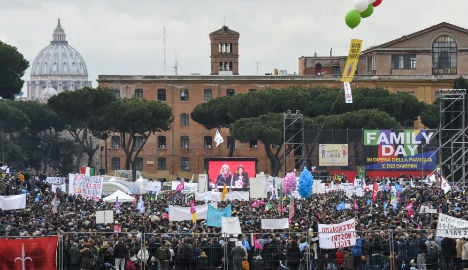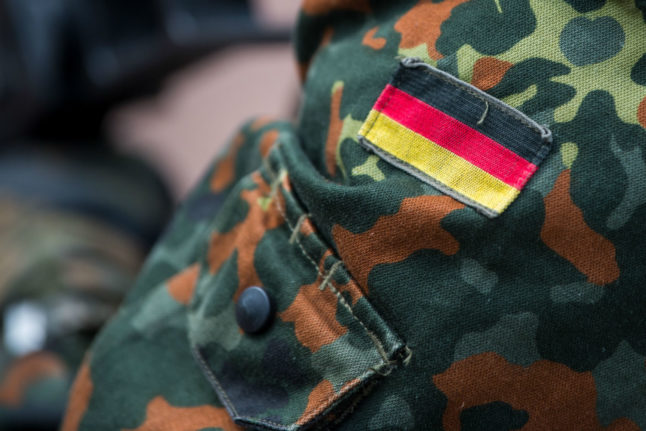GAY
Poor turnout for Rome anti-gay union protest
Tens of thousands of people gathered in Rome's Circus Maximus arena Saturday to protest against a civil unions bill for same-sex couples, a hot-potato issue for Prime Minister Matteo Renzi's government.
Published: 31 January 2016 09:14 CET

According to journalists only tens of thousands came to the Family Day. Photo: Andreas Solaro/AFP
But while organisers had been hoping to attract one million people and authorities had prepared for 500,000, journalists at the scene estimated the numbers to be in the tens of thousands. Official numbers were not immediately available.
“Without limits, our society will go mad!” organiser Massimo Gandolfini told the “Family Day” rally, as grandparents, parents and children held up banners reading “Wrong is wrong” in the capital's ancient Roman chariot racing stadium.
Italy is the last major Western country not to allow same-sex couples legal status.
The Senate began examining the bill on Thursday, which would enable gay people to commit to one another before a state official and, in certain circumstances, adopt each other's children and inherit residual pension rights.
“The bill is unacceptable, from the first word to the last,” said Gandolfini, who ushered onto the stage a series of guest speakers, all of whom insisted that the only legitimate form of family was “that of a mother and a
father”.
One huge red and white banner read “Renzi, we will remember” while a father who was digging into a picnic with his five children on the grassy banks of the arena had a placard reading: “Renzi, those who slip, fall”.
A group of protesters dressed up as knights from the Crusades vowed to defend Christian mores.
In 2007, another vast “Family Day” forced the centre-left government of Romano Prodi to drop a much less ambitious civil union project — and the failure of the bill was cited as one of the reasons behind the fall of his
government in early 2008.
Supporters say Italy has no choice this time but to change, pointing to repeated complaints from the European Court of Human Rights. But opponents hope their protest, backed by the Catholic Church, will put the brakes on the bill.
The Italian Bishops Conference (CEI) on Friday said it was “concerned” about the process that was underway “of putting marriage and civil unions on the same level — with the introduction of an alternative to the family”.
Centre-left Renzi has said he is confident the bill will pass, though there are several sticking points, in particular the ability to adopt the biological children of one's partner.
“This demonstration sends a clear sign to parliament, and I really think it should listen,” Environment Minister Gianluca Galletti said, as he joined the rally in Circo Massimo.
Rights groups had pleaded with would-be participants to change their mind ahead of the protest.
“It is statistically certain that among your children there are many boys and girls who, even if they've never confided in you, are gay, lesbian, bisexual or transgender,” the Agedo association of parents and friends of LGBT
people said.
It will not be an easy win for Renzi. His centre-right coalition allies are categorically opposed to adoption of children by a gay spouse, as is the Catholic fringe of the prime minister's own Democratic Party (PD).
Meanwhile, left-wing parties in the opposition and the anti-establishment Five Star movement (M5S) — whose support Renzi needs to get the bill through the Senate — are threatening to pull the plug if even one comma of the text is changed.
A final vote in the Senate is expected mid-February, after which the text will go before the lower house of parliament.
Url copied to clipboard!


 Please whitelist us to continue reading.
Please whitelist us to continue reading.
Member comments